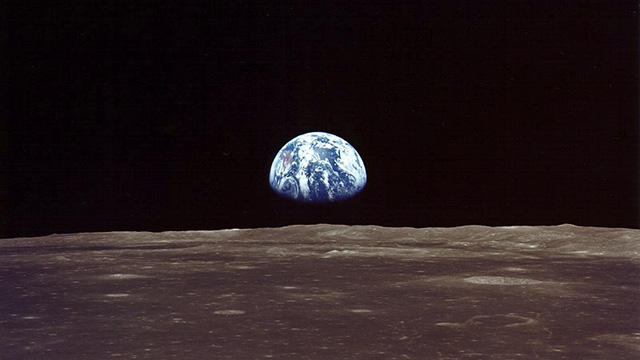“Forging a Sustainable Future” — Museum hosts Town Hall featuring Greg Fishel plus United Nations, White House and Museum experts
For immediate release ‐ December 15, 2015
Contact: Jon Pishney, 919.707.8083. Images available upon request

RALEIGH — Apollo’s 1969 photographs of the blue-green Earth with its wafer-thin atmosphere and nighttime sparkle of city lights have become among the world’s most evocative images. They stimulated the environmental stewardship movement and influenced the designation of this latest moment in Earth history as the Anthropocene to highlight, and try to mitigate, the cumulative extent of human impacts on natural systems. As the human population approaches 7.5 billion, how can societies and environments best be sustained?
Forging a sustainable future, both globally and locally, depends on the United Nations and institutions such as universities and museums working in new ways to build a public base of science-related knowledge. Join WRAL Chief Meteorologist Greg Fishel and his three guests: Ramu Damodaran, Chief of the United Nations Academic Impact; Lori Foster, Professor of Psychology at NC State University and Fellow with the White House Social and Behavioral Sciences Team; and Emlyn Koster, Director of the NC Museum of Natural Sciences for the next program in the Museum series, “The Nature of Science: A Town Hall with Greg Fishel.” Their conversation and audience discussion take place in the Museum’s WRAL 3D Theater on Thursday, January 14, 7–8:30 p.m., followed by a casual reception to meet the speakers.
The UN, in collaboration with world leaders, has adopted 17 Sustainable Development Goals to achieve the following objectives in the next 15 years: end poverty, promote prosperity and well-being for all, and protect the planet. Greg Fishel will facilitate the panel’s discussion about these goals, which will be introduced by several NC State University students, and in particular the goals that can potentially be achieved by advances in science and education. How will the UN be working more with ‘grassroots’ organizations, such as universities and museums, to educate, motivate and empower citizens on collective solutions? The audience will be encouraged to participate in the conversation.
“WRAL-TV is honored to be part of and support a series of Town Halls in conjunction with the Museum of Natural Sciences. What is more important than discussing the future of our planet?” said WRAL-TV Vice President and General Manager Steven D. Hammel.
Speaker Bios:
Ramu Damodaran’s responsibilities in the UN’s Outreach Division have focused on outreach to, and partnerships with, the non-governmental, academic and private sector constituencies, as well as to the general public. His most recent initiative is the United Nations Academic Impact.
Lori Foster’s research is at the intersection of work, psychology, technology and global development. In Washington, she serves on the new White House Social and Behavioral Sciences Team to help federal agencies increase the efficiency and efficacy of their programs and policies.
Emlyn Koster’s broader roles include committees of the Association of Science-Technology Centers and International Council of Museums. He recently participated in a workshop to explore how museums can best approach global challenges.
This program is the second in a new series at the Museum ― The Nature of Science: A Town Hall with Greg Fishel ― inspired by Albert Einstein’s view that “To raise new questions, new possibilities, to regard old problems from a new angle, requires creative imagination and marks real advance in science.” This program is designed to provide in-depth discussions with leaders from around the globe, as they explore the major scientific and environmental issues of our time. Comments and questions from the audience are encouraged. The event is made possible by the Friends of the NC Museum of Natural Sciences and Capitol Broadcasting Company.

